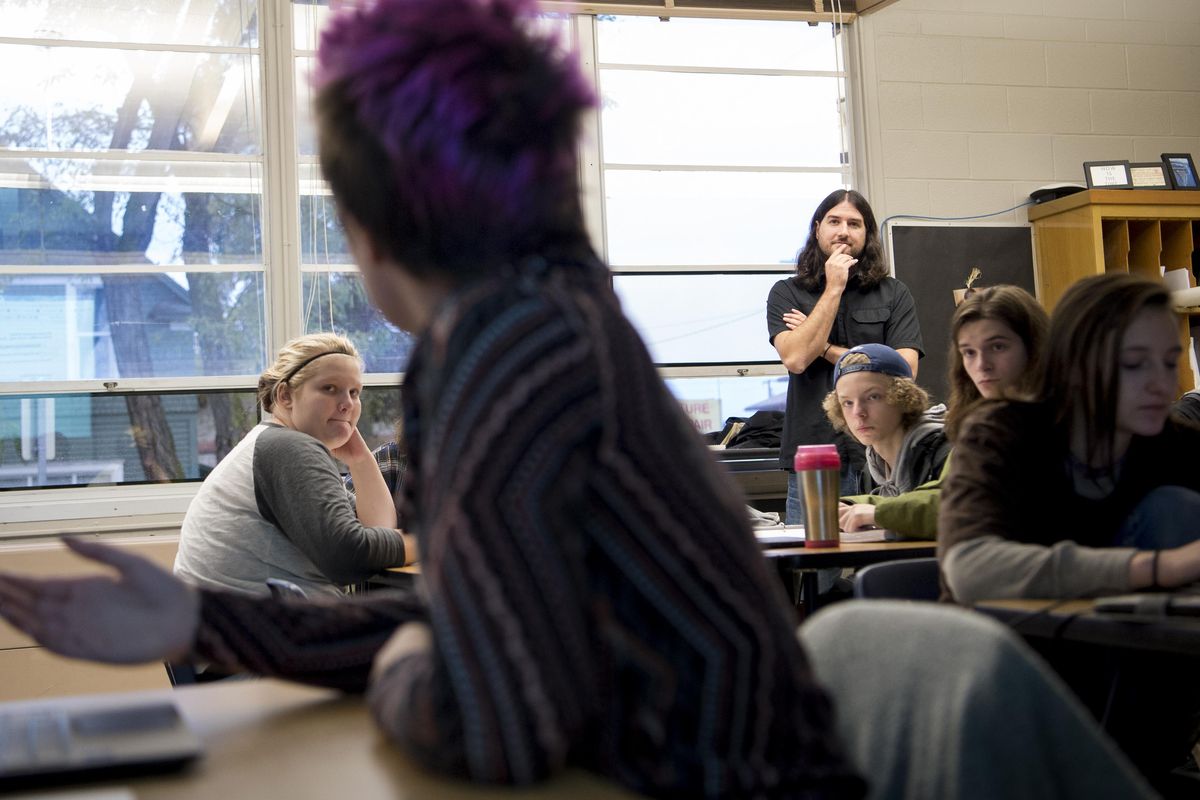Spokane-area teachers, students try to focus on policies of presidential candidates, not personalities

The morning after the third and final presidential debate, students at The Community School were committed to discussing policy.
“We’re not talking about scandals today,” said senior Curtis Bibb. “If you want to listen to scandals, that’s what the debates are for.”
Bibb, 17, is one of 33 students in David Egly’s civics class. For the past month, students have been researching candidates and ballot measures in preparation for November’s general election, Egly said.
During this election cycle, Egly and other teachers around Spokane are encouraging their students to focus on the policies of the candidates, not just on personalities and scandals.
It’s not an easy task.
“Unfortunately, because it’s so nasty, it’s not shocking anymore, which is so unfortunate,” said Chrissy Petterborg, a civics teacher at North Central High School. “At this point, like for all of us, they are just exhausted by it.”
At East Valley High School, Lori Merkel’s government class has undertaken a similar project.
Merkel, who has taught government at East Valley for 22 years, said most of her students get their news from social media.
“They knew nothing other than the personalities of the candidates,” she said. “They really didn’t know.”
In all three classes, students are researching candidates and issues at the federal, state and local levels in advance of November’s general election; all three classes are holding mock elections.
“I feel like there is too much of a focus on (scandals). That we’re not hearing about the issues,” said Bibb, at The Community School. “Just from listening to the debates, I don’t feel like I’m getting enough information.”
The process of researching and discussing has been particularly insightful for Bibb. He describes himself as coming from a family of Democrats. Yet, Bibb has found himself aligning with some state Republican candidates over one issue: the environment.
“It’s just sort of weird I’m leaning toward Republican,” he said.
For all three teachers, that sort of self-reflection is exactly the point. They keep their personal political beliefs under wraps, and encourage students to look beyond party lines.
“They are recognizing that it doesn’t have to be all or nothing,” Merkel said of her students.
And while that goal isn’t unusual, this year’s election climate makes it more difficult.
“When kids notice that (presidential candidates) are not even focused on policy, that tells you something,” Petterborg said.
Many are calling this year’s election season one of the most negative ever, and that negativity has trickled into schools.
According to a study by the Southern Poverty Law Center, 40 percent of teachers hesitate to teach about the election and half of teachers have seen an increase in uncivil political discourse and name-calling at school.
But a more scientific study conducted by the U.S. Department of Education shows an overall decline in bullying.
Brendin Wahl, 17, is a senior at The Community School and says he hasn’t seen any evidence of incivility and doesn’t see the election as substantially different from previous ones.
“It’s just like any other election,” he said. “It’s not as crazy important as people think. The actual issues of the politicians should come first.”
Although most Community School students are politically liberal, according to Bibb, those supporting Republican Donald Trump are treated well and not afraid to express their opinions.
That’s one thing Egly is adamant about: respectful disagreement.
“Feel free to disagree,” he said in class Thursday. “Please do. I love that. But we have to live with each other.”
And, Egly said, the energy and controversy associated with this election has provided a good teaching point.
“Whenever students have some outside connection with what we’re talking about in class it makes them so much more willing to participate,” he said. “They want to know. They want to understand it.”
Petterborg and Merkel also haven’t seen any sign of the political hostility in school. The discussions have been polite. In fact, Merkel said at first she had the opposite problem, her students were too apathetic.
That’s started to change as they learn more about the candidates and see how their policies could impact their lives.
This kind of effort, to distinguish the candidates’ personalities from their policies, can be an uphill battle.
“I think the image and the persona of (Trump) being a successful businessman has a lot of attraction for a lot of people it seems,” said James Headley, a political science professor at Eastern Washington University.
Headley conducted a poll in his Political Science 100 class. He said Clinton received 11 votes to Trump’s 10. There were three undecided.
While the students supporting Trump are adamantly on his side, those supporting Democrat Hillary Clinton are less enthusiastic about their choice.
The students at The Community School aren’t unaware of the nonpolitical scandals associated with both candidates, and they believe they do have some relevance to making an informed decision.
“Just because you’re the president of the United States doesn’t mean your personal background won’t impact (the presidency),” said Claire Reid, 17.
But Reid doesn’t think voting based solely on a candidate’s personality is right, either.
Merkel said when the 2005 “Access Hollywood” tape of Trump making lewd comments about women was released, they talked about it in her East Valley class.
“When it came up and we talked about it, one of the first things that is always said is this isn’t OK,” she said.
Ultimately, Egly hopes to help his students learn about the political and civic processes. Some of the high school seniors will be old enough to vote in this election. Properly preparing them for that responsibility is paramount, he said.
“I really try to get them focused on the issues and the ramifications,” Petterborg said. “That’s how you have to vote. You have to study.”